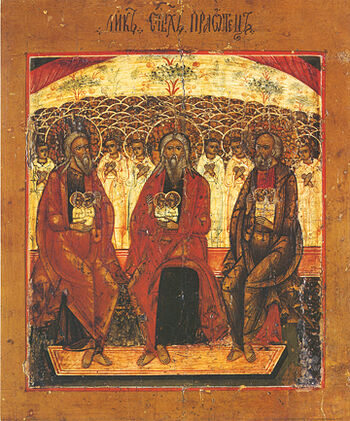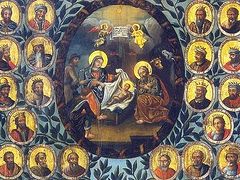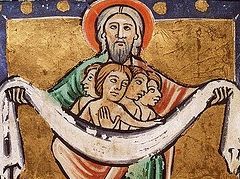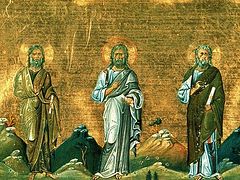Colossians 3:4-11; Luke 14:16-24
Some of us remember an old song with the line: “Freedom’s just another word for nothing left to lose.” Perhaps that rings true for people who think that they are isolated individuals who have no higher goal in life than doing whatever they want to do. It certainly does not ring true, however, for those who know that God gives us freedom as persons so that we may find our fulfillment in Him.
In today’s gospel lesson, we read about people who misused their freedom in order to refuse the invitation to join in a banquet that represents the Kingdom of God. They chose to use their daily routines and worldly responsibilities to excuse themselves from entering into great joy. One owned real estate, another had animals, and a third was married. Even though these are commonplace conditions, they used them to justify their refusal to accept the invitation to the great party. After the invited guests excused themselves from the banquet, the master commanded his servant to “Go out quickly to the streets and lanes of the city, and bring in the poor and maimed and blind and lame.” Because there was still room, the master ordered him to go out even further to “the highways and hedges, and compel people to come in, that my house may be filled.”
Perhaps there is a deeper spiritual significance to the symbolism of the yoke of five oxen in the parable, as there are five books of law in the Old Testament. Having a field of land may remind us of those who wanted the Messiah to set up a political-religious kingdom on Earth. Marriage may represent the perspective of those who thought that God’s blessings were only for their family line or ethnic group. Many certainly rejected our Lord because He fulfilled the law in a way that challenged the authority of the Pharisees, refused the temptation to become an earthly king of the Jews, and extended the blessing of His Reign even to Gentiles and Samaritans.
In the historical setting of the passage, “the poor and maimed and blind and lame” brought in from the streets to the great banquet surely represent the Gentiles, who were not the descendants of Abraham and did not have the benefit of the law and prophets of the Old Testament. Yes, we must learn to see ourselves as the “the poor and maimed and blind and lame” from the parable. Our salvation is not a matter of having the right human or cultural heritage or of having earned something by obeying religious laws. Instead, it is a matter of accepting with humility the gracious gift of God to broken people with no claim on the fulfillment of the great spiritual heritage of those who foreshadowed and foretold the coming of the Savior across the centuries before His birth.
Indeed, those who looked forward in faith to the coming of Christ in the Old Testament did not do so merely on the basis of their ancestry or observance of religious laws. They looked forward in faith to God’s fulfillment of the gracious promises to Abraham, who lived before the law came through Moses. The law was necessary for sinful people as a tutor in preparation for the coming of Christ. The ancestors of the Lord hoped not merely for a great teacher, but for One Who would liberate us from slavery to sin and death, which the law lacked the power to do. The forefathers of the Savior trusted God that their hope would not be in vain. Though it was often forgotten, the original promise to Abraham extended to the Gentiles, for God told him, “In you all the nations of the world will be blessed.” (Gen. 22:18) Now all who are in Christ “are Abraham’s seed, and heirs according to the promise.” (Gal. 3:29) Jew or Gentile, “those who are of faith are blessed with believing Abraham.” (Gal. 3:9)
The Hebrews of the Old Testament who prepared for the Messiah’s coming through faith did so of their own free will in response to their calling as the descendants of Abraham. That is true also for the Theotokos. She is the highest offering of the Hebrew people as one who became God’s living temple in a unique way as His virgin mother. She was chosen for this astounding vocation and responded in freedom to the message of the Archangel Gabriel. No one forced her to say “yes,” but she freely chose to do so. For us not to have freedom in responding to God would be to deny who we are as persons in the divine image and likeness. Since our salvation is the fulfillment of our calling to become like God in holiness, we must be free in order to embrace our healing as persons.
That is also true for those in today’s parable who chose to exclude themselves from the joy of the heavenly kingdom. The Old Testament is full of prophetic denunciations of worshiping other gods, engaging in sexual immorality, and exploiting the poor. The prophets warned against these and other sins because they were so common in the life of the people and so spiritually dangerous. Even though they had the great advantages of the law and the prophets, many of the Hebrews chose to ignore or corrupt them. They abused the freedom that God gave them to grow in faith by refusing to prepare for the coming of the Messiah Who would fulfill God’s promises to them and set us free from the tyranny of the grave. The consequences of this choice were and are profound. As the master said in the parable, ‘”For I tell you, none of those men who were invited shall taste my banquet.’ For many are called, but few are chosen.”
As we prepare to receive the Lord in faith at Christmas, we must use our freedom to follow St. Paul’s instruction in today’s epistle reading: “Put to death therefore what is earthly in you: fornication, impurity, passion, evil desire, and covetousness, which is idolatry.” He warns against “anger, wrath, malice, slander, and foul talk from your mouth.” He reminds his Gentile Christian readers that they “have put off the old nature with its practices and have put on the new nature, which is being renewed in knowledge after the image of its Creator.” We must live accordingly. Doing so requires that, in freedom, we refuse to remain enslaved to the corrupting power of sin and death from which the Savior has liberated us by becoming fully human and conquering the grave through His glorious resurrection.
He certainly does not force us to enter into the joy of the heavenly banquet, but if we refuse to entrust ourselves to Christ through free obedience, we will simply weaken ourselves spiritually and become further enslaved to our passions. To have faith in Christ is not merely to have warm feelings or nice thoughts about Him, but truly to seek first His Kingdom with every ounce of our being as we take up our crosses and follow Him. “Faith without works is dead,” (Jas. 2:26) and we must embrace the spiritual disciplines of the Nativity Fast as ways of following the good example of our Lord’s ancestors who prepared to receive Him through faith and faithfulness. The only other alternative is to fall into some form of idolatry in which we put fulfilling our own self-centered desires before God. Nothing could be more tragic than to corrupt our freedom to the point that we use it to serve only ourselves, regardless of the particular form that that takes in our lives. Instead, let us choose to prepare for the coming of Christ as “’the poor and maimed and blind and lame’” who will let nothing stop them from accepting an invitation that, in their humility, they know they do not deserve. That was the holy attitude of all the forefathers and foremothers of Savior, and it must be ours if we are going to enter into the joy of the Lord at Christmas.




